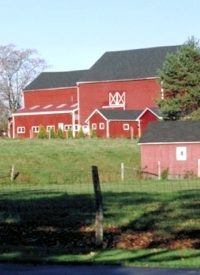
Though there is a slight dispute about the “oldest” family farm title going to the Shirley Plantation in Charles City, Virginia (founded in 1613 — up and running by 1638) or the Tuttle Farm in Dover, New Hampshire (begun in 1632, with Tuttle members running it ever since) – thanks to a recent Associated Press story there is no question that the Tuttle’s have now had enough.
When John Tuttle arrived in 1632, he could hardly have foreseen that his descendants would be running the place 378 years and 11 generations later. The account is that Tuttle had a small land grant from King Charles I to begin a farm near the present Maine-New Hampshire border. After surviving a shipwreck off the Maine coast, he took possession of his grant, about a 20-acre parcel. The farming part of the bargain began by his cutting down the stand of mature white pine trees located there, then proceeding to farm around the stumps.
About 300 years later, Grandfather William Penn Tuttle increased the farm to about 200 acres, but this year his grandchildren, Lucy and her brother Will — 65 and 63 respectively — plus their sister, have decided it is time to pass on the now 134-acre family business to more able bodies.
The asking price for this Tuttle treasure is $3.35 million. With its 2006 designation as conservation land there is a deed restriction stipulating that “it can’t be developed into strip malls or condos.” They are hoping it will fall into the hands of someone wanting to lovingly continue it as a farm.
When, in his day, Grandfather Tuttle was growing more produce than the family could use, he began to sell the excess, via horse and buggy at first, in the towns around Dover. According to the AP, it was his son, Hugh, “profiled in 1971 by Life magazine as the last of a dying breed, [who] developed irrigation ponds on the farm and was well-known in New Hampshire for his interest in soil and water conservation work before his death in 2002.” Lucy related that when her father was first thinking of selling the place some years ago, she and her siblings returned home to the 1780 farmhouse with a renewed interest in the family business. According to Lucy:
When they took over, Tuttle and her brother made changes, turning the farm into a year-round business instead of a seasonal one. They built a new farm stand to replace the family’s old red barn — now used for storage — and diversified the product offerings to include gourmet cheeses, baked goods, plants and other products.
The growing in recent years of “sweet corn, cucumbers, squash, tomatoes, and blueberries, raspberries and strawberries” was not enough to keep things solvent — there also accumulated some debt, along with the competition from supermarkets and pick-it-yourself farms. The Tuttles have been discouraging their children from following in their footsteps.
A family farm being sold so that the family no longer operates it, is not an unusual occurrence in America these days. Some facts concerning family-run farms were examined in the Daily Yonder, under its “Ag and Trade” section for July 30, in remarks about a recent U.S. Department of Agriculture 2010 Family Farm report:
Farmers are getting older and farms are getting bigger. And an increasing amount of farm products is grown or raised under contract, according to a new report on the American farm….
A “farm” here is defined as “any place from which $1,000 or more of agricultural products (crops and livestock) were sold or normally would have been sold” in a year.
A “family farm” is “any farm where the majority of the business is owned by the operator and individuals related to the operator…including relatives who do not reside in the operator’s household.”
Replacing this traditional family farm, though under slightly different appearances, may be a phenomenon now taking place in Massachusetts. The Boston Globe for August 2 reported this trend, saying:
After decades of decline, farming is resurging across the state. New farmers are graduates fresh out of college, immigrants with farming backgrounds, or former professionals starting second careers. Many begin as part-timers while hanging on to day jobs to supplement their incomes.
Those looking to make a new living from tilling the soil begin at training programs run by the state, universities, or nonprofit organizations — and the skills they learn have as much to do with running a business as with harvesting a crop….
The new, smaller farms capitalize on demand created by environmentalists and “locavores,’’ people who favor locally grown food, as well as the creation of new outlets for local produce. Small farmers can sell their modest harvests to community-supported agriculture programs, farmers markets, and restaurants that value fresh ingredients from nearby farms.
It is still a challenging way to make a living.
Challenges found throughout the Tuttle family story — challenges as old as Adam and Eve, who were told by the Lord: “In the sweat of your face shall you eat bread, till you return to the ground….”



